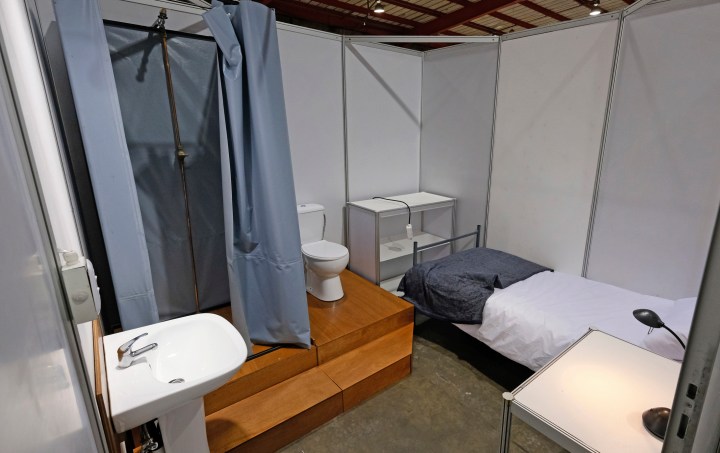Maverick Citizen Op-Ed
As ICUs fill up in the Western Cape, some lockdown measures must be reconsidered

The substantial relaxation of South Africa’s Covid-19 lockdown measures from Monday, 1 June was probably both inevitable and the right decision. But with intensive care unit capacity in the Western Cape already stretched and infections in the province rising rapidly, one or two measures may need to be reconsidered.
Last week, modelling was presented during a Western Cape government media conference suggesting that Covid-19 infections in the province are projected to peak by the end of June or early July 2020. As is the case nationally, it is anticipated that there will not be nearly enough intensive care unit (ICU) beds at the time of the peak. It was also reported that most of the public sector ICU beds in the province are already full and that the province is starting to run short of staff to treat people in ICU beds.
There will be some relief if agreements with the private sector can be finalised, something we understand is now up to the National Department of Health, but even so, the outlook is bleak.
Many who will need ICU beds will simply not be able to get them. Many who may have lived, had a bed been available, will die. Many healthcare workers will, or have already, experienced horrors that they will carry with them for the rest of their lives.
This is the context in which much of South Africa’s lockdown measures are being relaxed from 1 June.
Yet, that some degree of relaxation of the lockdown measures was required is widely accepted. The economic pressures are immense. People need food to eat. People need “normal” non-Covid-19 healthcare services. The trade-offs are devilishly complex. Those in government have my sympathy for the impossible position they are in.
But the fact that the situation is impossible, does not mean we should look away from the implications of the government’s decisions.
In South Africa, we are relaxing most of our lockdown measures prior to the epidemic peaking, or at least the current wave of the epidemic peaking. In this respect, our relaxing of restrictions differs greatly from those currently seen in Europe, where restrictions have mostly been lifted only after infections had peaked.
This is an important difference.
What fuels an epidemic as you climb toward its peak is contact between infectious and susceptible people. By lifting restrictions now, we are allowing the epidemic more fuel and to climb higher than would otherwise have been the case. More people will get sick in the next few months than would have otherwise. More will need critical care. More will die.
Broadly speaking, this is a horrific, but probably unavoidable consequence of the decisions that the government had to make to get the economy going and meeting the many other desperate needs people have. Painful as the consequences of these big-picture decisions have been, until now, most of them have been, if not perfect, certainly defendable.
And yet, there now seems to be a sense that things are beginning to fray at the edges, that the pressure, the politics, the lobbying from all sides and probably also the in-fighting, is getting to our leaders. Like with an overly tired footballer, some passes are going straight to the opposition – errors we can’t afford at a time when we need pin-point accuracy.
Right now, the stakes are highest in the Western Cape.
With cases already rising alarmingly and with the peak of the province’s infections projected to be just a month away, the decision to allow religious gatherings and to open schools may give the epidemic more fuel at exactly the moment we can least afford it.
The government could allow religious gatherings in most of the country, but not in parts of the Western Cape and Eastern Cape. This kind of nuance is, after all, part of the thinking behind the hot-spot strategy. Especially with restrictions on inter-provincial travel, provinces have separate epidemics running on separate timelines and with different local dynamics.
Similarly, the national-level decision to lift the ban on the sale of alcohol comes arguably at the worst possible time for the Cape Town metro, given that public ICU beds in the metro are already nearing capacity. That bars and nightclubs aren’t opening will probably mean that alcohol-related ICU admissions won’t go back to pre-lockdown levels, but an increase nevertheless seems likely.
Either way, one hopes alcohol-related ICU submissions in the metro will be closely watched. If there is a significant number of alcohol-related admissions in the next week or so, the government should reinstate the alcohol ban in the area. It would be the right thing to do, both for our healthcare workers and for those who will need ICU beds because of Covid-19.
None of this is to say we should return to the strict lockdowns we had under Level 4 and Level 5. Such far-reaching lockdowns are blunt instruments, ill-suited to the careful balancing of health, economic and social pressures that we now require. Instead, what we need is for the nuance promised by the hot-spot strategy to be translated into concrete, targeted interventions based on a rational assessment of the available evidence.
If that means some carefully selected lockdown measures have to be reinstated in the Western Cape or in the Cape Town metro, then so be it. DM/MC
*This article was produced by Spotlight – health journalism in the public interest. Sign up for our newsletter and stay informed.

"Information pertaining to Covid-19, vaccines, how to control the spread of the virus and potential treatments is ever-changing. Under the South African Disaster Management Act Regulation 11(5)(c) it is prohibited to publish information through any medium with the intention to deceive people on government measures to address COVID-19. We are therefore disabling the comment section on this article in order to protect both the commenting member and ourselves from potential liability. Should you have additional information that you think we should know, please email [email protected]"



 Become an Insider
Become an Insider